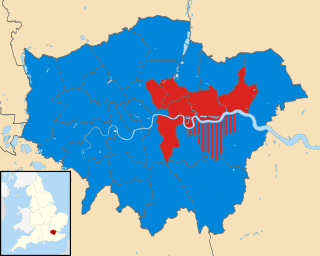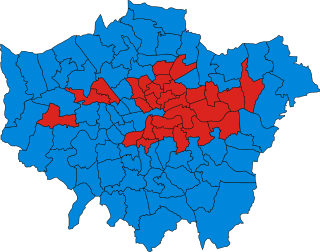
The Greater London Council (GLC) was the top-tier local government administrative body for Greater London from 1965 to 1986. It replaced the earlier London County Council (LCC) which had covered a much smaller area. The GLC was dissolved in 1986 by the Local Government Act 1985 and its powers were devolved to the London boroughs and other entities. A new administrative body, known as the Greater London Authority (GLA), was established in 2000.

The second election to the Greater London Council was held on 13 April 1967, and saw the first Conservative victory for a London-wide authority since 1931.

The third election to the Greater London Council was held on 9 April 1970 and saw a Conservative victory with a reduced majority.

The fourth election to the Greater London Council (GLC) was held on 12 April 1973. Labour won a large majority of 58 seats to 32 for the Conservatives; the Liberals also won their first two seats on the council.

The fifth election to the Greater London Council (GLC) was held on 5 May 1977. The Conservatives, led by Horace Cutler, gained control of the council from Labour.

Westminster City Council is the local authority for the City of Westminster in Greater London, England. The city is divided into 20 wards, each electing three councillors. The council is currently composed of 31 Labour Party members and 23 Conservative Party members. The council was created by the London Government Act 1963 and replaced three local authorities: Paddington Metropolitan Borough Council, St Marylebone Metropolitan Borough Council and Westminster Borough Council.

The 1964 London local elections were held on 7 May 1964. They were the inaugural elections for the thirty-two London boroughs, which were created on 1 April 1965 by the London Government Act 1963. All seats were up for election, with polling stations open between 08:00 and 21:00.
Havering was an electoral division for the purposes of elections to the Greater London Council. The constituency elected three councillors for a three-year term in 1964, 1967 and 1970. Bill Fiske, the first leader of the Greater London Council, was elected from the division.
Harrow West was an electoral division for the purposes of elections to the Greater London Council. The constituency elected one councillor for a four-year term in 1973, 1977 and 1981, with the final term extended for an extra year ahead of the abolition of the Greater London Council.
Harrow Central was an electoral division for the purposes of elections to the Greater London Council. The constituency elected one councillor for a four-year term in 1973, 1977 and 1981, with the final term extended for an extra year ahead of the abolition of the Greater London Council.
Harrow East was an electoral division for the purposes of elections to the Greater London Council. The constituency elected one councillor for a four-year term in 1973, 1977 and 1981, with the final term extended for an extra year ahead of the abolition of the Greater London Council.
Camden was an electoral division for the purposes of elections to the Greater London Council. The constituency elected three councillors for a three-year term in 1964, 1967 and 1970.
Harrow was an electoral division for the purposes of elections to the Greater London Council. The constituency elected three councillors for a three-year term in 1964, 1967 and 1970.
Hammersmith was an electoral division for the purposes of elections to the Greater London Council. The constituency elected three councillors for a three-year term in 1964, 1967 and 1970.
Bexley was an electoral division for the purposes of elections to the Greater London Council. The constituency elected three councillors for a three-year term in 1964, 1967 and 1970.
Ealing was an electoral division for the purposes of elections to the Greater London Council. The constituency elected four councillors for a three-year term in 1964, 1967 and 1970.
Greenwich was an electoral division for the purposes of elections to the Greater London Council. The constituency elected three councillors for a three-year term in 1964, 1967 and 1970.
Haringey was an electoral division for the purposes of elections to the Greater London Council. The constituency elected three councillors for a three-year term in 1964, 1967 and 1970.
Hounslow was an electoral division for the purposes of elections to the Greater London Council. The constituency elected three councillors for a three-year term in 1964, 1967 and 1970.
Wandsworth was an electoral division for the purposes of elections to the Greater London Council. The constituency elected four councillors for a three-year term in 1964, 1967 and 1970.







